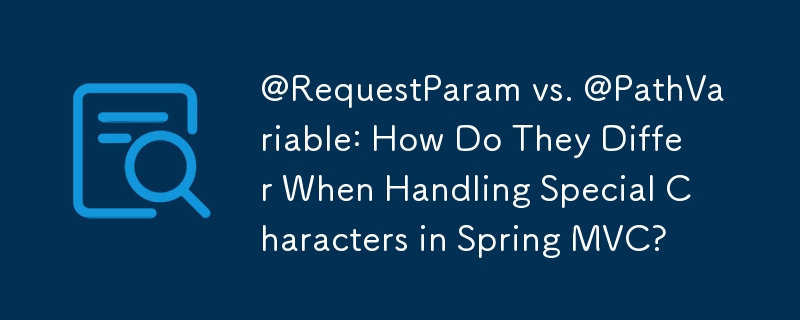 Java
Java
 javaTutorial
javaTutorial
 @RequestParam vs. @PathVariable: How Do They Differ When Handling Special Characters in Spring MVC?
@RequestParam vs. @PathVariable: How Do They Differ When Handling Special Characters in Spring MVC?
@RequestParam vs. @PathVariable: How Do They Differ When Handling Special Characters in Spring MVC?

Understanding the Differences Between @RequestParam and @PathVariable in Handling Special Characters
When working with special characters in web applications, it is crucial to understand the distinctions between @RequestParam and @PathVariable annotations.
@RequestParam vs. @PathVariable
In Spring MVC applications, @RequestParam is used to extract parameters from the request query string, while @PathVariable is employed to extract placeholders from the URI template. They both serve distinct purposes:
- @RequestParam: Obtains parameters from the URI query string, such as "?param=value". It allows for optional parameters and supports data binding (e.g., converting strings to integers).
- @PathVariable: Extracts placeholders from the URI template, such as "/user/{userId}/invoices". It does not support optional parameters or data binding.
Handling Special Characters
When handling special characters, such as " ", the behavior of @RequestParam and @PathVariable differs:
- @RequestParam: Treats " " as a space character.
- @PathVariable: Preserves " " as a special character.
This difference arises due to the purpose of each annotation. @RequestParam treats parameters as non-path components and may decode special characters to improve usability. Conversely, @PathVariable maintains the integrity of the URI template and does not alter special characters.
Practical Example
Consider the following controller method:
@RequestMapping(value = "/user/{userId}/invoices", method = RequestMethod.GET)
public List<Invoice> listUsersInvoices(
@PathVariable("userId") int user,
@RequestParam(value = "date", required = false) Date dateOrNull) {
// ...
}With the URL "http://localhost:8080/MyApp/user/1234/invoices?date=12-05-2013", the @RequestParam parameter "date" will be populated with the value "12-05-2013". On the other hand, the @PathVariable "userId" will contain the value 1234, regardless of any special characters in the URI.
The above is the detailed content of @RequestParam vs. @PathVariable: How Do They Differ When Handling Special Characters in Spring MVC?. For more information, please follow other related articles on the PHP Chinese website!

Hot AI Tools

Undresser.AI Undress
AI-powered app for creating realistic nude photos

AI Clothes Remover
Online AI tool for removing clothes from photos.

Undress AI Tool
Undress images for free

Clothoff.io
AI clothes remover

Video Face Swap
Swap faces in any video effortlessly with our completely free AI face swap tool!

Hot Article

Hot Tools

Notepad++7.3.1
Easy-to-use and free code editor

SublimeText3 Chinese version
Chinese version, very easy to use

Zend Studio 13.0.1
Powerful PHP integrated development environment

Dreamweaver CS6
Visual web development tools

SublimeText3 Mac version
God-level code editing software (SublimeText3)

Hot Topics
 1392
1392
 52
52
 36
36
 110
110
 Is the company's security software causing the application to fail to run? How to troubleshoot and solve it?
Apr 19, 2025 pm 04:51 PM
Is the company's security software causing the application to fail to run? How to troubleshoot and solve it?
Apr 19, 2025 pm 04:51 PM
Troubleshooting and solutions to the company's security software that causes some applications to not function properly. Many companies will deploy security software in order to ensure internal network security. ...
 How to elegantly obtain entity class variable names to build database query conditions?
Apr 19, 2025 pm 11:42 PM
How to elegantly obtain entity class variable names to build database query conditions?
Apr 19, 2025 pm 11:42 PM
When using MyBatis-Plus or other ORM frameworks for database operations, it is often necessary to construct query conditions based on the attribute name of the entity class. If you manually every time...
 How to simplify field mapping issues in system docking using MapStruct?
Apr 19, 2025 pm 06:21 PM
How to simplify field mapping issues in system docking using MapStruct?
Apr 19, 2025 pm 06:21 PM
Field mapping processing in system docking often encounters a difficult problem when performing system docking: how to effectively map the interface fields of system A...
 How does IntelliJ IDEA identify the port number of a Spring Boot project without outputting a log?
Apr 19, 2025 pm 11:45 PM
How does IntelliJ IDEA identify the port number of a Spring Boot project without outputting a log?
Apr 19, 2025 pm 11:45 PM
Start Spring using IntelliJIDEAUltimate version...
 How to safely convert Java objects to arrays?
Apr 19, 2025 pm 11:33 PM
How to safely convert Java objects to arrays?
Apr 19, 2025 pm 11:33 PM
Conversion of Java Objects and Arrays: In-depth discussion of the risks and correct methods of cast type conversion Many Java beginners will encounter the conversion of an object into an array...
 What is the difference between memory leaks in Java programs on ARM and x86 architecture CPUs?
Apr 19, 2025 pm 11:18 PM
What is the difference between memory leaks in Java programs on ARM and x86 architecture CPUs?
Apr 19, 2025 pm 11:18 PM
Analysis of memory leak phenomenon of Java programs on different architecture CPUs. This article will discuss a case where a Java program exhibits different memory behaviors on ARM and x86 architecture CPUs...
 How to use the Redis cache solution to efficiently realize the requirements of product ranking list?
Apr 19, 2025 pm 11:36 PM
How to use the Redis cache solution to efficiently realize the requirements of product ranking list?
Apr 19, 2025 pm 11:36 PM
How does the Redis caching solution realize the requirements of product ranking list? During the development process, we often need to deal with the requirements of rankings, such as displaying a...
 How to convert names to numbers to implement sorting within groups?
Apr 19, 2025 pm 01:57 PM
How to convert names to numbers to implement sorting within groups?
Apr 19, 2025 pm 01:57 PM
How to convert names to numbers to implement sorting within groups? When sorting users in groups, it is often necessary to convert the user's name into numbers so that it can be different...



